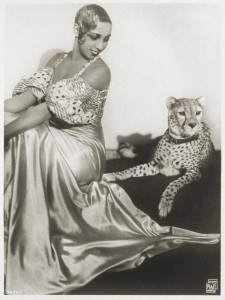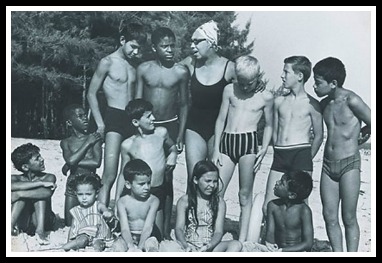The following post was written by Beth Fleming (Oklahoma City University), coordinator of the Music Library Association's Women in Music Round Table:
 Josephine Baker died forty years ago today (April 12). She was born Freda Josephine McDonald in St. Louis, Missouri on June 3, 1906 to a washerwoman named Carrie McDonald and a vaudeville drummer named Eddie Carson, who left the mother and child shortly after Josephine’s birth. At the impressionable age of eleven Josephine witnessed firsthand some of the most frightening moments in the history of St. Louis when race riots of 1917 caused her to see the Ku Klux Clan in action. This had a profound effect on Josephine; so much so that much of the rest of her life was spent trying to help the world see that skin color really shouldn’t matter in the grand scheme of things. Her particular way of demonstrating this involved leaving her birth country to make a name for herself with La Revue Nègre in France, and then using that fame and fortune to create and support her own utopian idea of how the world should be by gathering together an adoptive family of twelve children from all over the world that she called the rainbow tribe. She was quoted as saying "Surely the day will come when color means nothing more than the skin tone, when religion is seen uniquely as a way to speak one's soul; when birth places have the weight of a throw of the dice and all men are born free, when understanding breeds love and brotherhood." In today’s society many will notice similarities between forward-thinking Josephine and the family and sentiments of Angelina Jolie and Brad Pitt. She sang about her her utopian vision of her family in “Dans mon village” (In my village):
Josephine Baker died forty years ago today (April 12). She was born Freda Josephine McDonald in St. Louis, Missouri on June 3, 1906 to a washerwoman named Carrie McDonald and a vaudeville drummer named Eddie Carson, who left the mother and child shortly after Josephine’s birth. At the impressionable age of eleven Josephine witnessed firsthand some of the most frightening moments in the history of St. Louis when race riots of 1917 caused her to see the Ku Klux Clan in action. This had a profound effect on Josephine; so much so that much of the rest of her life was spent trying to help the world see that skin color really shouldn’t matter in the grand scheme of things. Her particular way of demonstrating this involved leaving her birth country to make a name for herself with La Revue Nègre in France, and then using that fame and fortune to create and support her own utopian idea of how the world should be by gathering together an adoptive family of twelve children from all over the world that she called the rainbow tribe. She was quoted as saying "Surely the day will come when color means nothing more than the skin tone, when religion is seen uniquely as a way to speak one's soul; when birth places have the weight of a throw of the dice and all men are born free, when understanding breeds love and brotherhood." In today’s society many will notice similarities between forward-thinking Josephine and the family and sentiments of Angelina Jolie and Brad Pitt. She sang about her her utopian vision of her family in “Dans mon village” (In my village):

Joséphine Baker and her Rainbow Tribe
This fascinating woman is far more well-known in France than she is in the United States, and with good reason. Josephine served France during World War II in several ways. She performed for the troops, and was an honorable correspondent for the French Resistance (undercover work included smuggling secret messages written on her music sheets) and a sub-lieutenant in the Women's Auxiliary Air Force. She was later awarded the Medal of the Resistance with Rosette and named a Chevalier of the Legion of Honor by the French government for her hard work and dedication. Her career began when she was a chorus girl for The Dixie Steppers in Sissle and Blake's production of Shuffle Along, the first musical with a completely African-American cast. She came to greatest fame, though, as a burlesque dancer in La Revue Nègre quickly becoming renowned for her barely-there dresses and no-holds-barred comic yet slightly erotic dance routines. Eventually she held starring roles in films such as ZouZou (1934) and Princesse Tam Tam (1935) and her special brand of exotic beauty generated nicknames such as "Black Venus," "Black Pearl," "Creole Goddess" and “First Black Superstar.” Remarkably, she maintained energetic performances and a celebrity status for 50 years. It was during her 68th year while Josephine was staging yet another successful comeback in order to support her rainbow tribe that the dynamic performer slipped into a coma. She died from a cerebral hemorrhage at 5 a.m. on April 12, 1975. More than 20,000 people crowded the streets of Paris to watch the funeral procession on its way to the Church of the Madeleine. The French government honored her with a 21-gun salute, making Josephine Baker the first American woman buried in France with military honors. Her gravesite is in the Cimetiére de Monaco, Monaco.
Official website of Josephine Baker:
http://www.cmgww.com/stars/baker/index.php
Chasing a Rainbow: The Life of Joséphine Baker—biographical video [contains nudity]
Listen to this playlist, which includes her most famous song, “J’ai Deux Amours” (My two loves):
Photographs from the History Chicks.
- Facebook Like
- Share on Facebook
- Log in to post comments

